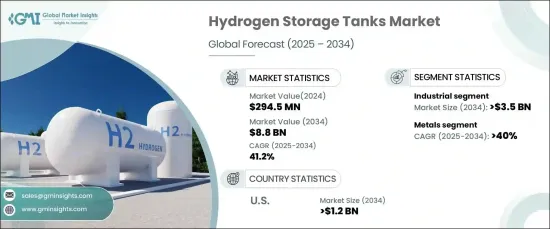
|
시장보고서
상품코드
1666624
수소 저장탱크 시장 기회, 성장 촉진요인, 산업 동향 분석 및 예측(2025-2034년)Hydrogen Storage Tanks Market Opportunity, Growth Drivers, Industry Trend Analysis, and Forecast 2025 - 2034 |
||||||
세계의 수소 저장탱크 시장은 2024년에 2억 9,450만 달러에 이르렀고, 2025년부터 2034년까지 CAGR은 41.2%로 확대될 것으로 예측됩니다.
이 놀라운 성장의 배경은 수송과 산업 분야에서 수소 채택이 증가하고 있으며, 고압 탱크와 극저온 탱크와 같은 고급 저장 솔루션이 필수적이라는 점입니다. 산업계가 보다 지속가능한 에너지원으로 향하는 가운데 수소는 깨끗한 대체연료로서 지지를 모으고 있습니다. 특히 수소경제가 기세를 늘리기 시작함에 따라 신뢰성이 높고 효율적이고 확장 가능한 저장 시스템에 대한 필요성이 커지고 있습니다. 경량 복합재료는 탱크 효율 향상, 안전성 향상, 비용 절감에 매우 중요한 역할을 하고 있으며, 에너지 캐리어로서 수소로의 신속한 이행을 촉진하고 있습니다. 또한 연료 보급 네트워크와 저장 방법을 포함한 수소 인프라에 대한 정부의 많은 투자가 시장 확대를 가속화하고 있습니다.

특히 산업부문은 정제, 금속가공, 유리제조 등의 중요한 용도로 수소에 대한 의존도가 높아지고 있기 때문에 2034년까지 35억 달러를 창출할 것으로 예측되고 있습니다. 신재생에너지로의 전환과 에너지수입 의존지역의 수소저장 솔루션의 전략적 필요성은 시장 수요 증가에 기여하고 있습니다. 산업계가 비용 효율적이고 지속 가능한 대체품에 주목하는 가운데 수소 저장탱크는 증가하는 에너지 수요를 충족시키기 위해 필수적입니다.
| 시장 범위 | |
|---|---|
| 시작 연도 | 2024년 |
| 예측 연도 | 2025-2034년 |
| 시작 금액 | 2억 9,450만 달러 |
| 예측 금액 | 88억 달러 |
| CAGR | 41.2% |
제품별로는 금속 기반 수소 저장탱크가 2034년까지 연평균 복합 성장률(CAGR) 40%로 성장할 것으로 예측됩니다. 이 성장의 주요 원인은 이 재료의 탁월한 강도와 내구성입니다. 탄소섬유와 고분자 수지의 조합은 구조적 무결성을 보장하면서 극도의 압력을 견딜 수 있는 견고한 복합재료를 형성하여 금속 기반 탱크를 수소 저장을 위한 높은 신뢰성을 제공합니다.
미국에서 수소 저장탱크 시장은 2034년까지 12억 달러를 창출할 것으로 예상됩니다. 이 급성장의 배경에는 청정 에너지에 대한 적극적인 투자와 수소 인프라 기술 발전이 있습니다. 특히 수소자동차나 재생가능에너지시스템이 주목을 받으면서 고압저장시스템 수요가 증가하고 있습니다. 미국은 수소의 에너지원으로서의 실용성을 높이는 경량 고압 저장 솔루션의 개발에서도 약진하고 있습니다.
목차
제1장 조사 방법과 조사 범위
- 시장 범위와 정의
- 시장 추계·예측 파라미터
- 예측 계산
- 데이터 소스
- 1차 데이터
- 2차 데이터
- 유료
- 공개
제2장 주요 요약
제3장 업계 인사이트
- 생태계 분석
- 규제 상황
- 업계에 미치는 영향요인
- 성장 촉진요인
- 업계의 잠재적 위험 및 과제
- 성장 가능성 분석
- Porter's Five Forces 분석
- 공급기업의 협상력
- 구매자의 협상력
- 신규 참가업체의 위협
- 대체품의 위협
- PESTEL 분석
제4장 경쟁 구도
- 서론
- 전략적 전망
- 혁신과 지속가능성의 전망
제5장 시장 규모와 예측 : 소재별(2021-2034년), 100만 달러
- 주요 동향
- 금속
- 유리 섬유
- 탄소 섬유
제6장 시장 규모와 예측 : 탱크 유형별(2021-2034년), 100만 달러
- 주요 동향
- 유형 1
- 유형 2
- 유형 3
- 유형 4
제7장 시장 규모와 예측 : 압력별(2021-2034년), 100만 달러
- 주요 동향
- 200 bar 미만
- 200-500 bar
- 500 bar 이상
제8장 시장 규모와 예측 : 저장 형태별(2021-2034년), 100만 달러
- 주요 동향
- 물리적 기반
- 재료 기반
제9장 시장 규모와 예측 : 용도별(2021-2034년), 100만 달러
- 주요 동향
- 산업용
- 운수
- 기타
제10장 시장 규모와 예측 : 지역별(2021-2034년), 100만 달러
- 주요 동향
- 북미
- 미국
- 캐나다
- 멕시코
- 유럽
- 독일
- 영국
- 프랑스
- 이탈리아
- 네덜란드
- 러시아
- 아시아태평양
- 중국
- 인도
- 일본
- 한국
- 세계 기타 지역
제11장 기업 프로파일
- BayoTech
- Doosan Mobility Innovation
- ECS
- Hensoldt
- Hexagon Purus
- Luxfer Gas Cylinders
- Mahytec
- NPROXX
- Plastic Omnium
- Pragma Industries
- Quantum Fuel Systems
- Steelhead Composites
- Umoe Advanced Composites
- Weldship
- Worthington Industries
The Global Hydrogen Storage Tanks Market reached USD 294.5 million in 2024 and is projected to expand at an impressive CAGR of 41.2% from 2025 to 2034. This remarkable growth is fueled by the increasing adoption of hydrogen in both the transportation and industrial sectors, where advanced storage solutions like high-pressure and cryogenic tanks are becoming essential. As industries move toward more sustainable energy sources, hydrogen is gaining traction as a clean fuel alternative. The need for reliable, efficient, and scalable storage systems is rising, particularly as the hydrogen economy begins to gain more momentum. Lightweight composite materials are playing a pivotal role in improving tank efficiency, enhancing safety, and reducing costs, thus fostering a quicker transition to hydrogen as an energy carrier. Moreover, significant government investments in hydrogen infrastructure, including refueling networks and storage methods, are accelerating the market expansion.

The industrial sector, in particular, is projected to generate USD 3.5 billion by 2034, driven by the growing reliance on hydrogen in crucial applications such as refining, metal processing, and glass manufacturing. The shift towards renewable energy and the strategic necessity for hydrogen storage solutions in energy-import-dependent regions are contributing to the market's increasing demand. As industries focus on cost-effective and sustainable alternatives, hydrogen storage tanks have become indispensable for meeting growing energy needs.
| Market Scope | |
|---|---|
| Start Year | 2024 |
| Forecast Year | 2025-2034 |
| Start Value | $294.5 Million |
| Forecast Value | $8.8 Billion |
| CAGR | 41.2% |
Looking at the product segment, the metal-based hydrogen storage tanks are anticipated to grow at a CAGR of 40% by 2034. This growth is primarily driven by the material's exceptional strength and durability. The combination of carbon fibers with polymer resins forms a robust composite material capable of withstanding extreme pressures while ensuring structural integrity, making metal-based tanks highly reliable for hydrogen storage.
In the United States, the hydrogen storage tank market is forecast to generate USD 1.2 billion by 2034. This surge is backed by substantial investments in clean energy initiatives, as well as technological advancements in hydrogen infrastructure. The demand for high-pressure storage systems is growing, especially as hydrogen-powered vehicles and renewable energy systems gain prominence. The U.S. is also making strides in the development of lightweight, high-pressure storage solutions that enhance hydrogen's practicality as an energy source.
Table of Contents
Chapter 1 Methodology & Scope
- 1.1 Market scope & definitions
- 1.2 Market estimates & forecast parameters
- 1.3 Forecast calculation
- 1.4 Data sources
- 1.4.1 Primary
- 1.4.2 Secondary
- 1.4.2.1 Paid
- 1.4.2.2 Public
Chapter 2 Executive Summary
- 2.1 Industry synopsis, 2021 - 2034
Chapter 3 Industry Insights
- 3.1 Industry ecosystem analysis
- 3.2 Regulatory landscape
- 3.3 Industry impact forces
- 3.3.1 Growth drivers
- 3.3.2 Industry pitfalls & challenges
- 3.4 Growth potential analysis
- 3.5 Porter's analysis
- 3.5.1 Bargaining power of suppliers
- 3.5.2 Bargaining power of buyers
- 3.5.3 Threat of new entrants
- 3.5.4 Threat of substitutes
- 3.6 PESTEL analysis
Chapter 4 Competitive Landscape, 2024
- 4.1 Introduction
- 4.2 Strategic outlook
- 4.3 Innovation & sustainability landscape
Chapter 5 Market Size and Forecast, By Material, 2021 – 2034 (USD Million)
- 5.1 Key trends
- 5.2 Metals
- 5.3 Glass fibers
- 5.4 Carbon fibers
Chapter 6 Market Size and Forecast, By Tank Type, 2021 – 2034 (USD Million)
- 6.1 Key trends
- 6.2 Type 1
- 6.3 Type 2
- 6.4 Type 3
- 6.5 Type 4
Chapter 7 Market Size and Forecast, By Pressure, 2021 – 2034 (USD Million)
- 7.1 Key trends
- 7.2 Below 200 bar
- 7.3 200 - 500 bar
- 7.4 Above 500 bar
Chapter 8 Market Size and Forecast, By Storage Form, 2021 – 2034 (USD Million)
- 8.1 Key trends
- 8.2 Physical based
- 8.3 Material based
Chapter 9 Market Size and Forecast, By Application, 2021 – 2034 (USD Million)
- 9.1 Key trends
- 9.2 Industrial
- 9.3 Transportation
- 9.4 Others
Chapter 10 Market Size and Forecast, By Region, 2021 – 2034 (USD Million)
- 10.1 Key trends
- 10.2 North America
- 10.2.1 U.S.
- 10.2.2 Canada
- 10.2.3 Mexico
- 10.3 Europe
- 10.3.1 Germany
- 10.3.2 UK
- 10.3.3 France
- 10.3.4 Italy
- 10.3.5 Netherlands
- 10.3.6 Russia
- 10.4 Asia Pacific
- 10.4.1 China
- 10.4.2 India
- 10.4.3 Japan
- 10.4.4 South Korea
- 10.5 Rest of World
Chapter 11 Company Profiles
- 11.1 BayoTech
- 11.2 Doosan Mobility Innovation
- 11.3 ECS
- 11.4 Hensoldt
- 11.5 Hexagon Purus
- 11.6 Luxfer Gas Cylinders
- 11.7 Mahytec
- 11.8 NPROXX
- 11.9 Plastic Omnium
- 11.10 Pragma Industries
- 11.11 Quantum Fuel Systems
- 11.12 Steelhead Composites
- 11.13 Umoe Advanced Composites
- 11.14 Weldship
- 11.15 Worthington Industries




















